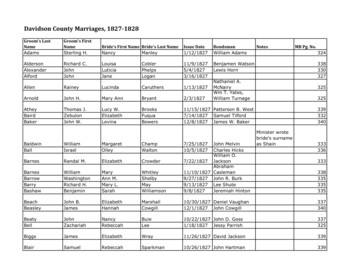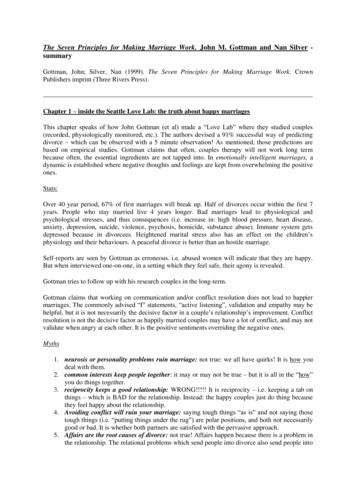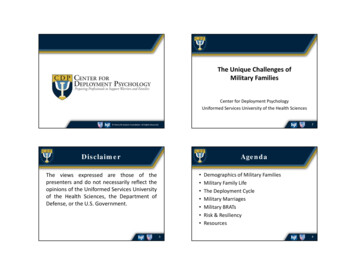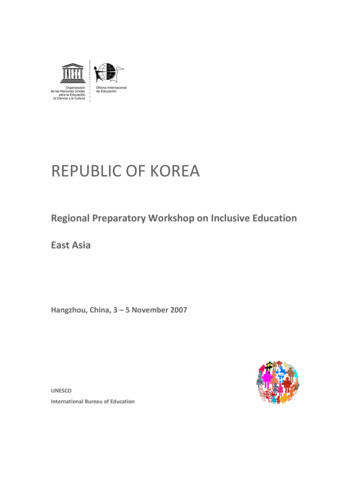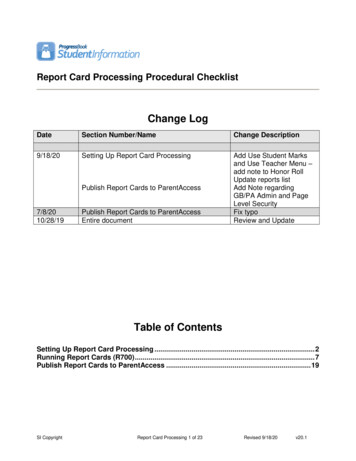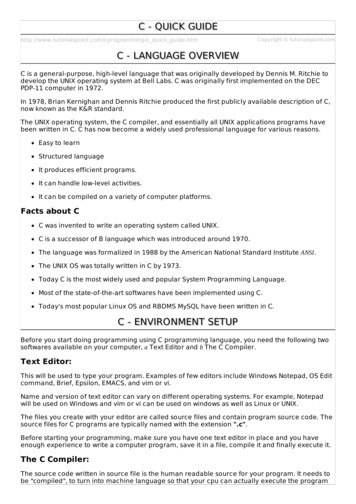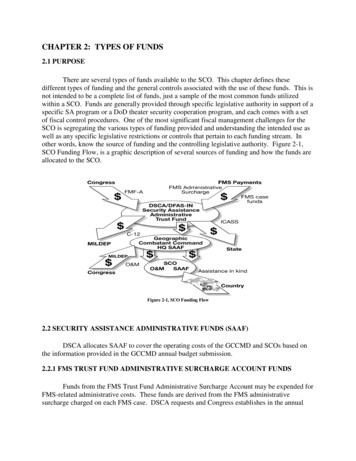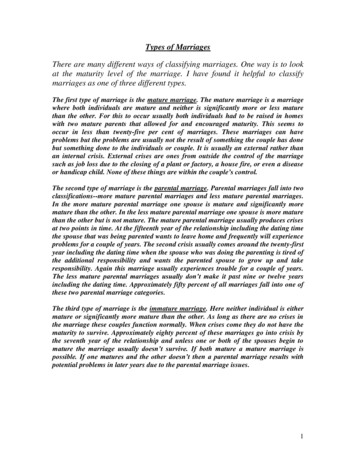
Transcription
Types of MarriagesThere are many different ways of classifying marriages. One way is to lookat the maturity level of the marriage. I have found it helpful to classifymarriages as one of three different types.The first type of marriage is the mature marriage. The mature marriage is a marriagewhere both individuals are mature and neither is significantly more or less maturethan the other. For this to occur usually both individuals had to be raised in homeswith two mature parents that allowed for and encouraged maturity. This seems tooccur in less than twenty-five per cent of marriages. These marriages can haveproblems but the problems are usually not the result of something the couple has donebut something done to the individuals or couple. It is usually an external rather thanan internal crisis. External crises are ones from outside the control of the marriagesuch as job loss due to the closing of a plant or factory, a house fire, or even a diseaseor handicap child. None of these things are within the couple’s control.The second type of marriage is the parental marriage. Parental marriages fall into twoclassifications--more mature parental marriages and less mature parental marriages.In the more mature parental marriage one spouse is mature and significantly moremature than the other. In the less mature parental marriage one spouse is more maturethan the other but is not mature. The mature parental marriage usually produces crisesat two points in time. At the fifteenth year of the relationship including the dating timethe spouse that was being parented wants to leave home and frequently will experienceproblems for a couple of years. The second crisis usually comes around the twenty-firstyear including the dating time when the spouse who was doing the parenting is tired ofthe additional responsibility and wants the parented spouse to grow up and takeresponsibility. Again this marriage usually experiences trouble for a couple of years.The less mature parental marriages usually don’t make it past nine or twelve yearsincluding the dating time. Approximately fifty percent of all marriages fall into one ofthese two parental marriage categories.The third type of marriage is the immature marriage. Here neither individual is eithermature or significantly more mature than the other. As long as there are no crises inthe marriage these couples function normally. When crises come they do not have thematurity to survive. Approximately eighty percent of these marriages go into crisis bythe seventh year of the relationship and unless one or both of the spouses begin tomature the marriage usually doesn’t survive. If both mature a mature marriage ispossible. If one matures and the other doesn’t then a parental marriage results withpotential problems in later years due to the parental marriage issues.1
ExamplesSally and Bob had been married twenty-five years. They both came fromgood homes. Sally had worked while Bob finished college and then whileBob started his job Sally raised the kids with Bob and then went to technicaltraining while the kids were in school. Everything was fine until Bob lost hisjob due to the company laying- off executives because of an economicdownturn. Bob had been trying to find work without much success and wasnow becoming discouraged. Sally was concerned about Bob and thereforesuggested they seek counseling to see what could be done.This is an example of a mature marriage. Any marriage can have problemsand any individual can become discouraged or even depressed. This coupleis staying together and working together to try to find a solution. NeitherBob nor Sally created this problem. It was not the result of anything theycould have done or not done. They have a problem but are working as acouple to solve it. They need help because it is more then they can deal withat this time as a couple.Jim and Sandy had been married twenty-one years. Jim had always takencare of everything. If there was a problem in the home or at work, it was hisresponsibility to deal with it. Sandy was a good wife and mother. Shebelieved that Jim loved her and that all was right with the world. They haddated about eighteen months prior to getting married. With the onset ofchildren, he felt more and more like her father and less and less like herlover. Frequently he felt that all the burdens of the family were his to bear.Although they had two children, he often felt like he was the father to three—including Sandy. Imagine Sandy’s surprise when she found out that Jim hadbeen having an affair with a woman at work. Initially, Jim didn’t want tobreak off the affair. He was tired of being a parent, but he did care aboutSandy. Eventually he terminated the affair and decided to work on hismarriage.Paul and Barbara had been married thirteen years. They had dated for twoyears prior to marriage. Although the first few years were rough, once theywere established they felt things had gotten better especially when Barbarahad gotten her promotion at work. Gradually Barbara found the skills shelearned at work were applicable in the home and decided to run the home inthe same way. Paul, never one to assert himself, eventually let Barbaramanage everything. Around the fifteenth year of the relationship Paul met2
someone at the Y where he worked out and began an innocent conversation.Since they shared a mutual interest in working out and since he saw herevery time he went to the Y it was only natural that Paul would begin toconfide more and more in his new friend. One day he realized it was a loteasier to talk to and be with the woman from the Y then Barbara.Jack and Mary had been married for ten years. He had taken over the familybusiness after they had been married a year or two. Up to that point in time,they seemed to have a good marriage. When he went into the family businesshe encountered many problems and seemed to regress in maturation. Hewent from making mutual decisions with Mary to allowing Mary to run thehome and raise the children mainly by herself. Mary didn’t want this. Shewanted a husband by her side that would pull his own weight. When Jack’sbusiness began to fail Mary decided to bail. She had had enough.The above three examples are all examples of parental marriage. The firstone represents problems at the twenty-first year of the relationship. Thesecond one represents problems at the fifteenth year of the relationship.However, these are both mature parental marriages. The third example is anexample where Mary was more mature than Jack but not significantly moremature in order to sustain a longer-term parental marriage. This is anexample of an immature parental marriage.Dave and Maggie were in love. Everything was right with the world. He washer shining knight and she was his princess. It was a fairy tale. After a yearof marriage they both woke up. It was a nightmare. He wasn’t what shethought he was and she wasn’t what he thought she was. Neither had beentaught how to handle finances or make decisions. When trouble cameneither had same sex role models to draw from or to turn to. Eventually theweight of marital responsibility was too great. By the fourth year ofmarriage, which meant for this couple they had been together five years,they were done.This is an example of an immature marriage. Here neither is mature orsignificantly more mature than the other.It is possible to start with an immature marriage and as crises come begin amaturation process. Dave and Maggie could have matured to a parentalmarriage or a mature marriage depending whether or not both or one ofthem matured through their crises.3
Types of MaturityWe have been discussing maturity, but what does that mean? There aredifferent ingredients to maturity. We can see how physically mature a personis by just looking at them. But how do we determine emotional and spiritualmaturity? Sometimes we can determine mental maturity through languagedevelopment or intelligence. What about experiential maturity or the abilityto relate maturely to someone? Each of these brings to maturity a differentingredient. Taken together they can give us an indication of the maturationof an individual or a marriage.Maturity ScalesRate yourself on the following scales. One is the least mature and ten is themost mature.Physical Maturity: the ability to sense and meet my spouse’s physical needs.Dealing with my spouse’s need for touch and affection as well as sex andphysical intimacy.1 2 3 4 5 6 7 8 9 10Mental Maturity: the ability to intellectually know and exchange informationwith my spouse--the ability to talk intelligently and have an intelligentconversation on significant topics.1 2 3 4 5 6 7 8 9 10Emotional Maturity: the ability to understand my spouse’s feelings andemotions and read their non-verbal communications and moods andcommunicate sensitively.1 2 3 4 5 6 7 8 9 10Experiential Maturity: the ability to share and communicate with my spousethrough mutual experiences or wisdom that comes from enough individualexperiences sometimes known as common sense.1 2 3 4 5 6 7 8 9 10Spiritual Maturity: the ability to communicate with my spouse through godlywisdom acquired through and under the influence of the Holy Spirit throughspiritual disciplines of prayer, scripture, meditation, and fellowship.1 2 3 4 5 6 7 8 9 10Relational Maturity: the ability to obtain and sustain a mature relationshipwith my spouse regardless of the types of stresses or crises the marriage4
encounters putting the other above areas of maturity to use within themarriage.1 2 3 4 5 6 7 8 9 10My highest level of maturity is (circle one) physical, mental, emotional,experiential, spiritual, or relational.My lowest level of maturity is (circle one) physical, mental, emotional,experiential, spiritual, or relational.My spouse rated his/her highest level of maturity as (circle one) physical,mental, emotional, experiential, spiritual, or relational.My spouse rated his/her lowest level of maturity as (circle one) physical,mental, emotional, experiential, spiritual, or relational.Our MarriageAs I think of our marriage and reflect back on the descriptions of the types ofmarriages as well as how my spouse and I have rated our different types ofmaturity I would say our marriage is: (circle one)Mature: we both rate ourselves as mature and equally mature.Parental: one of us rates themselves as significantly more mature.Immature: we both rate ourselves as immature.Regardless of how you rated your marriage, we can all have maturemarriages and still have areas of immaturity. The rating just helps us tobetter understand where we need to work and what changes we need tomake. You do not have to agree with your spouse at this point, but it isimportant to at least try to understand their perspective. Understandingleads to change.Pray with your spouse after completing this assignment and see what deeperunderstanding and wisdom you may gain from your discussion. How wouldyou like your marriage to improve and mature?5
The second type of marriage is the parental marriage. Parental marriages fall into two classifications--more mature parental marriages and less mature parental marriages. In the more mature parental marriage one spouse is mature and significantly more mature than the other. In the less mature parental marriage one spouse is more mature

